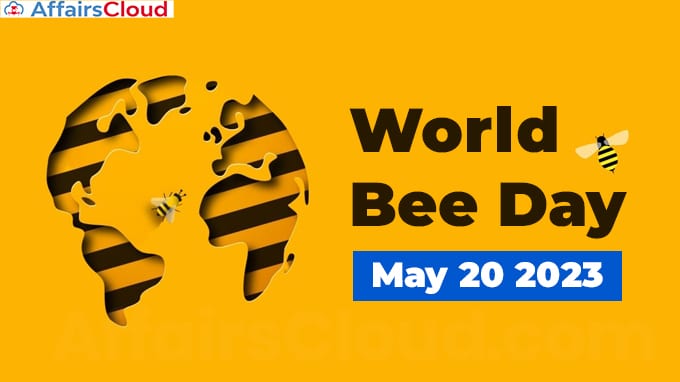 United Nations (UN)’s World Bee Day is annually observed across the globe on May 20 to raise awareness of the importance of adopting pollinator-friendly agricultural production practices to protect bees and other pollinators, while contributing to the resilience, sustainability and efficiency of agrifood systems.
United Nations (UN)’s World Bee Day is annually observed across the globe on May 20 to raise awareness of the importance of adopting pollinator-friendly agricultural production practices to protect bees and other pollinators, while contributing to the resilience, sustainability and efficiency of agrifood systems.
The theme of World Bee Day 2023 observed on 20th May 2023 is “Bee engaged in pollinator-friendly agricultural production”.
- It is a call for global action to support pollinator-friendly agricultural production and highlights the importance of protecting bees and other pollinators, particularly through evidence-based agricultural production practices.
As part of the celebration of World Bee Day 2023, the Food and Agriculture Organization of the United Nations (FAO) has organised a hybrid event under this year’s theme.
Aim:
The day aims to strengthen measures aimed at protecting bees and other pollinators, which would significantly contribute to solving problems related to the global food supply and eliminate hunger in developing countries.
Background:
i. World Bee Day was proposed by the Republic of Slovenia at the FAO Regional Conference for Europe in 2016.
- In 2017, the proposal for World Bee Day was submitted for consideration at the 40th Session of the FAO Conference.
ii. The United Nations General Assembly (UNGA) adopted the resolution A/RES/72/211 on 20th December 2017 and proclaimed May 20 of every year as World Bee Day.
iii. The 1st ever World Bee Day was observed on 20th May 2018.
Why May 20?
The 20th of May is the birth anniversary of Slovenian-born Anton Janša, who pioneered modern beekeeping (apiculture) techniques in the 18th century.
Apiculture:
Apiculture is the scientific method of rearing honeybees. The word ‘apiculture’ comes from the Latin word ‘apis‘ meaning bee.
Importance of Bees and Pollinators:
i. Bees are mong the most crucial pollinators, ensuring food production, food security, sustainable agriculture, and biodiversity. They also play a vital role in climate change mitigation and environmental protection.
ii. By pollinating, Bees increase agricultural production, thus maintaining diversity and variety in the fields.
iii. Pollination:
- It is the highest agricultural contributor to yields worldwide, contributing far beyond any other agricultural management practice.
- Bees and other pollinators make important contributions to agriculture.
- 35% of the world’s agricultural land is affected by pollinators, which help produce 87 of the leading food crops globally.
Status:
i. According to the FAO, Bees and other pollinators are under threat.
ii. Present species extinction rates are 100 to 1000 times higher than normal due to human impacts.
Efforts of the UN:
i. In 2000, the International Pollinator Initiative (IPI) was established (COP decision v/5, section II) at the 5th Conference of Parties (COP V) as a cross-cutting initiative to promote the sustainable use of pollinators in agriculture and related ecosystems under the Convention on Biological Diversity (CBD) and UN’s FAO.
ii. In addition to the IPI, the FAO also provides technical help to countries on a variety of issues, such as queen breeding, artificial insemination, sustainable solutions for honey production, and export marketing.
About the Food and Agriculture Organization of the United Nations (FAO):
Director-General- QU Dongyu
Headquarters- Rome, Italy
Establishment- 1945
Members- 194 member states,




